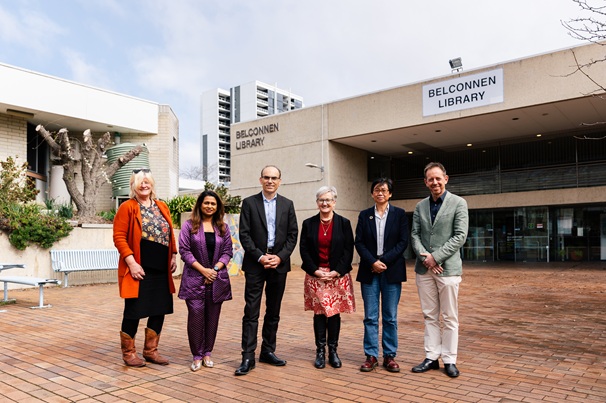Suzanne Lazaroo
15 September 2025: As the weather warms across Australia – making heatwaves and bushfires loom front of mind – the University of Canberra’s Healthy Environments and Lives (HEAL) Global Research Centre has launched an Australian-first project to assess how community centres can provide shelter from exposure to heat and air pollution, and drive climate change adaptation in the face of changing urban environments.
Drawing first on libraries as archetypal community spaces and prospective shelters, the Climate Resilience Centres project was recently launched at the Belconnen Library by Shane Rattenbury MLA and Professor Michelle Lincoln, the University Deputy Vice-Chancellor.

The project will assess selected libraries and other public spaces in the ACT and Western Sydney, to see how they measure up as community hubs to mitigate the effects of extreme events like heatwaves and bushfires – and then develop scalable strategies and inform national and regional policy.
Led by the University of Canberra, the project is funded by the National Health and Medical Research Council (NHMRC) over the next three years; project partners include the University of Technology Sydney (UTS), University of Sydney, University of Tasmania, RMIT, and CSIRO, among others.
Professor Sotiris Vardoulakis, HEAL Centre Director and lead investigator on the project, said that in the face of the increasingly frequent and intense extreme weather events caused by climate change, it’s essential to have safe, accessible hubs providing shelter for the community.
“As we saw with the Black Summer fires of 2019-2020, people need to be able to find a space where they can be protected from the smoke and heat, especially if they are from a vulnerable group, have an existing medical condition and/or don’t have that kind of protection in their own homes, for whatever reason,” he said.
Safe community spaces would ideally provide respite to help avoid the exacerbation of existing conditions in vulnerable people – protecting from illness, decreased quality of life, and even death. This aims to ease pressure on the healthcare system, in a valuable ripple effect of impact.

Professor Vardoulakis and the HEAL Global Research Centre team are considering the term ‘safe space’ in a holistic sense.
“We will be assessing the physical and cultural safety for all, as well as whether the necessary filtration and cooling systems are in place, and whether the space can be occupied for a longer period of time,” he said.
“We will look into building design and human movement patterns, whether these spaces can be accessed by all, including families, children, and people with disability. Will people be able to get to the community hub, will they be able to find it easily – what about those who have no means of private transport? These are all considerations for community access.”
Making sure a building is as impermeable to bushfire smoke as possible is a special consideration of the project. To this end, sensors that measure air quality, temperature and humidity will be installed in each public space assessed.
“In addition, there should be an availability of information in these spaces, so that people can seek advice about health and environment if they need it. And we would look at the possibility of catering as well,” Professor Vardoulakis said.

With such a holistic approach, the multi-faceted project will involve experts from a range of fields and disciplines, including the health sciences, technology, built environment and design, and environmental science, to name a few.
This interdisciplinary cooperation is a hallmark of the broader HEAL National Research Network’s ethos and approach – the project launch was held in conjunction with a HEAL ACT Community of Practice (COP) meeting at the Belconnen Library, which saw over 40 people from local government, community groups, and research organisations attending.
“The HEAL ACT COP brings together diverse stakeholders from the community, researchers and policymakers, people from all parts of government – particularly in the health and environment and social services areas, to share knowledge and ideas,” said Assistant Professor Ro McFarlane, the ACT HEAL COP Co-lead.
“We want to build trust and knowledge exchange and address what are really shaping up to be the big challenges of the 21st century – we need everyone to navigate the challenges of climate and environmental change, leaving no-one behind.

This latest HEAL ACT Community of Practice gathering successfully bridged key gaps in knowledge, practice and policy for climate, the environment and health in the ACT and region.
“We urgently need long-term solutions to the crisis of climate change – but we also need to have immediate responses to protect the community, such as the Climate Resilience Centres project,” Assistant Professor McFarlane said.
The next meeting of the HEAL ACT Community of Practice is on 4 November 2025, organised as part of the HEAL Network’s annual conference. The theme of the conference is Weaving Diverse Knowledges into Climate Action for Better Health.


